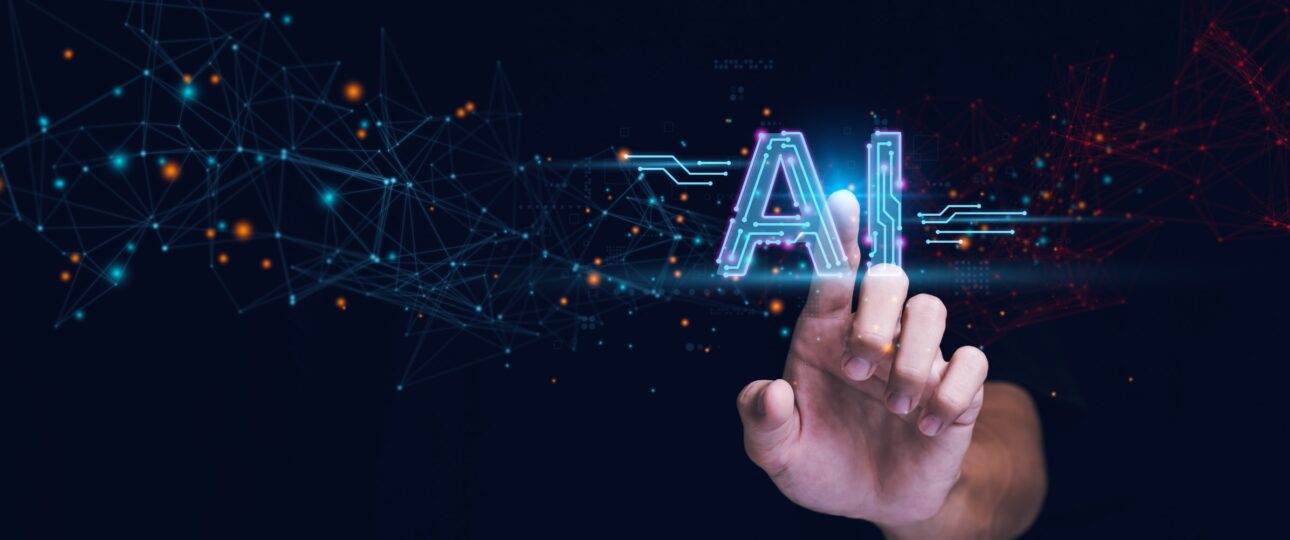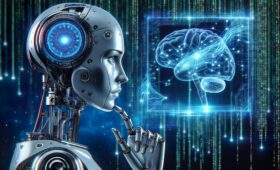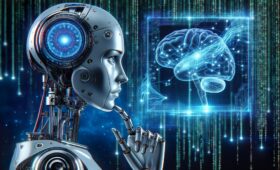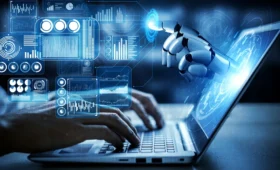Artificial intelligence (AI) has moved from being a science fiction concept to a driving force in today’s technological revolution. With its potential to transform industries, enhance everyday life, and solve complex global challenges, AI is reshaping the world as we know it. As we look to the future, it’s clear that AI will play an increasingly important role in shaping everything from business practices to healthcare and even our personal lives.
This article explores how AI is evolving, the potential impacts on various sectors, and the opportunities and challenges that come with these advancements.
1. AI and Business Transformation
AI is revolutionizing the way businesses operate, from automating routine tasks to improving decision-making and creating innovative products and services. Machine learning algorithms and data analysis tools enable businesses to gain deep insights into consumer behavior, streamline operations, and enhance customer experiences.
Key Considerations:
- AI-powered automation is helping businesses improve efficiency by reducing the need for manual work and optimizing processes.
- AI-driven analytics are enabling companies to make data-backed decisions and predict market trends.
- Customer service has been transformed by AI chatbots and virtual assistants, providing 24/7 support and enhancing user satisfaction.
Pro Tip: Companies that integrate AI solutions into their operations are likely to gain a competitive edge, leveraging technology to enhance productivity and reduce costs.
2. AI in Healthcare: Revolutionizing Medicine
AI is making significant strides in healthcare, from improving diagnosis and treatment plans to enabling personalized medicine. AI-driven systems are helping doctors analyze medical data more accurately and efficiently, leading to better patient outcomes.
Key Considerations:
- AI algorithms are being used to analyze medical images, detect diseases such as cancer, and even predict patient conditions.
- AI-powered diagnostic tools can assist in early disease detection, leading to better preventative care and treatment.
- Robotic surgeries powered by AI are improving precision and reducing recovery times for patients.
Pro Tip: As AI continues to evolve in healthcare, it promises to make medical treatments more personalized and accessible to a wider range of patients.
3. AI in Education: Personalized Learning
Artificial intelligence is also making waves in the education sector. By enabling personalized learning experiences and helping educators track student progress, AI is improving the quality and accessibility of education.
Key Considerations:
- AI-powered learning platforms adapt to individual student needs, helping them learn at their own pace and providing tailored educational content.
- Automated grading systems are freeing up educators’ time, allowing them to focus on engaging with students and improving lesson quality.
- Smart classrooms are using AI technology to enhance the learning environment, creating interactive and engaging educational experiences.
Pro Tip: AI in education is helping bridge the gap in learning, offering personalized education that accommodates different learning styles and paces.
4. The Role of AI in the Workforce: Automation and Jobs
As AI technology evolves, it’s transforming the workforce. Automation is replacing many repetitive and manual tasks, leading to increased productivity and efficiency. However, this shift also brings concerns about job displacement and the future of work.
Key Considerations:
- Robotic process automation (RPA) and AI-driven software are handling routine tasks in fields like finance, manufacturing, and customer service.
- AI is creating new job opportunities in fields like data science, AI research, and robotics engineering.
- Workers will need to adapt by gaining new skills in AI and related technologies to stay competitive in the evolving job market.
Pro Tip: Embrace lifelong learning and upskilling to stay relevant in the job market as AI transforms industries and creates new opportunities.
5. AI Ethics and Responsible Development
As AI continues to advance, the ethical implications of its use are becoming a major area of focus. Issues such as data privacy, algorithmic bias, and accountability are crucial considerations in the development and deployment of AI technologies.
Key Considerations:
- Bias in AI algorithms can perpetuate discrimination if the data used to train the models is not diverse or representative.
- Data privacy concerns are growing as AI systems collect and analyze large amounts of personal information.
- It’s essential to develop frameworks and policies that ensure AI is used ethically and responsibly, with human oversight in decision-making.
Pro Tip: AI developers must prioritize transparency, fairness, and accountability in their systems to build trust and ensure positive outcomes.
6. AI and the Future of Transportation: Autonomous Vehicles
One of the most exciting areas of AI development is autonomous vehicles. AI is playing a critical role in the development of self-driving cars, trucks, and drones, with the potential to revolutionize transportation.
Key Considerations:
- Self-driving cars use AI to navigate roads, make decisions in real-time, and avoid accidents, promising safer and more efficient travel.
- AI-powered drones are being used for deliveries, inspections, and emergency response, streamlining logistics and reducing human labor.
- Autonomous vehicles could significantly reduce traffic accidents, lower transportation costs, and increase mobility for people with disabilities.
Pro Tip: Autonomous vehicles could reshape how we think about transportation, but challenges related to safety, regulation, and infrastructure need to be addressed for widespread adoption.
7. The Impact of AI on Consumer Experience
AI is transforming how consumers interact with brands and products. From personalized recommendations to voice-activated assistants, AI is enhancing customer experiences and making shopping more convenient.
Key Considerations:
- AI-driven recommendations on platforms like Amazon and Netflix use algorithms to suggest products and media based on consumer preferences.
- Voice assistants like Amazon Alexa and Apple Siri are changing how consumers interact with technology, offering hands-free control and real-time assistance.
- AI-powered chatbots are providing 24/7 customer support, solving issues quickly and improving customer satisfaction.
Pro Tip: Businesses that leverage AI to provide personalized experiences and streamline customer interactions are likely to increase customer loyalty and satisfaction.
8. AI and Sustainability: Tackling Global Challenges
AI is also playing a critical role in addressing global challenges such as climate change, energy efficiency, and resource management. By analyzing vast amounts of environmental data, AI is helping develop more sustainable solutions for the planet.
Key Considerations:
- AI is helping predict climate patterns, identify energy-saving opportunities, and optimize the use of resources to reduce waste.
- AI-driven models can assist in sustainable agriculture by predicting crop yields, detecting pests, and optimizing irrigation.
- AI technologies are also used in smart grids, which allow for more efficient energy distribution and management.
Pro Tip: AI has the potential to drive significant progress in sustainability, providing innovative solutions for a more sustainable future.
Conclusion
The future of AI is bright, with the technology continuing to evolve at a rapid pace. As AI becomes more integrated into business, healthcare, education, and other sectors, it offers unprecedented opportunities for innovation, efficiency, and improved quality of life. However, the responsible development and ethical use of AI must remain a priority to ensure that its benefits are maximized while minimizing any potential risks.
As AI continues to shape the world, businesses, governments, and individuals must adapt to these changes by embracing AI technologies, investing in skill development, and staying informed about the ethical implications of these powerful systems.




